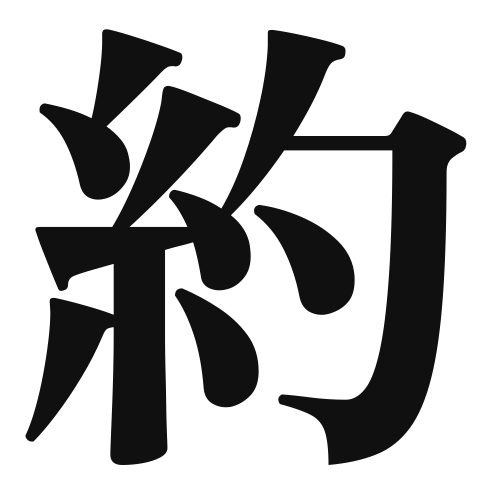1. Overview of Meaning
The kanji “約” (yaku) generally means “approximately,” “about,” or “to promise.” It is often used to indicate an estimation or a commitment in various contexts.
2. Formation and Radical
Formation of the Kanji: The kanji “約” is a combination of two components. The left part, “言” (gen), relates to speech or words, while the right part, “約” (yaku), originally depicted a binding or a promise. This kanji can be classified as a compound character (会意文字), as it combines meanings to convey the idea of a verbal agreement or approximation.
Radical: The radical of “約” is “言” (gen), which is associated with language and communication.
3. Examples of Usage
Common Words and Phrases:
- 約束 (やくそく, yakusoku) – promise
- 約数 (やくすう, yakusuu) – approximate number
- 約二時間 (やくにじかん, yaku nijikan) – about two hours
Example Sentences in Daily Conversation:
- 会議は約一時間かかります。 (かいぎはやくいちじかんかかります。) – The meeting will take about one hour.
- 彼は約束を守る人です。 (かれはやくそくをまもるひとです。) – He is a person who keeps his promises.
4. Synonyms and Antonyms
Similar Kanji:
- 概 (がい, gai) – meaning “outline” or “general idea,” which is similar but less specific than “約.”
- 近 (きん, kin) – meaning “near” or “close,” which can imply approximation but in a different context.
Antonyms:
- 正確 (せいかく, seikaku) – meaning “accurate” or “exact,” which is the opposite of “約” in terms of precision.
5. Cultural and Historical Background
Relation to Japanese Culture: The concept of “約” is deeply embedded in Japanese culture, where promises and commitments are highly valued. The idea of keeping one’s word is considered a virtue.
Proverbs and Idioms:
- 約束は守るべき (やくそくはまもるべき) – “Promises should be kept,” emphasizing the importance of fulfilling commitments.
